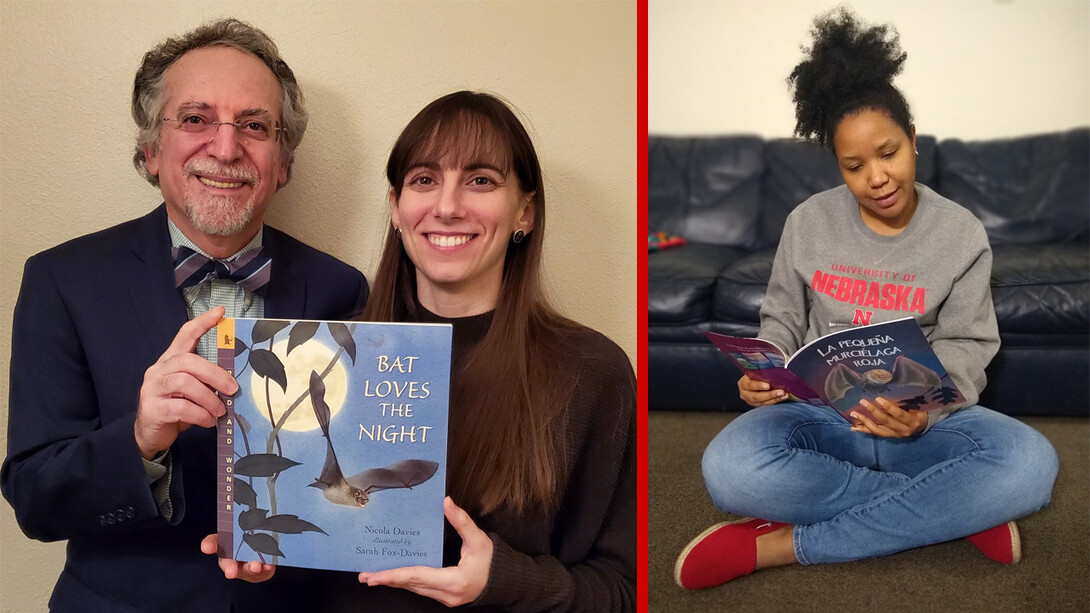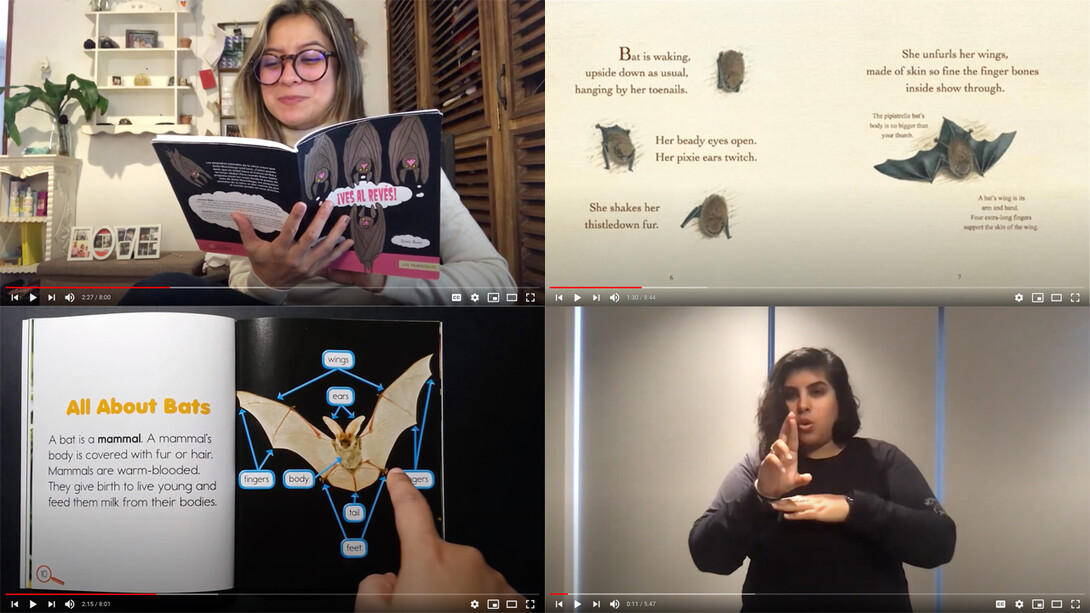
El murciélago. وَطْواط. Kelelawar. 박쥐. Baton.
In any language, 2020 has been a rough year for bats. The only mammal capable of true flight saw its already-spotty reputation dragged through more mud as conjecture, then early research, suggested that SARS-CoV-2 may have evolved from a coronavirus ancestor dwelling in some bat species.
Brianne Wolf, a part-time graduate student in natural resource sciences and a global programs manager for the Institute of Agriculture and Natural Resources, acknowledges that bats could use some help in the PR department.
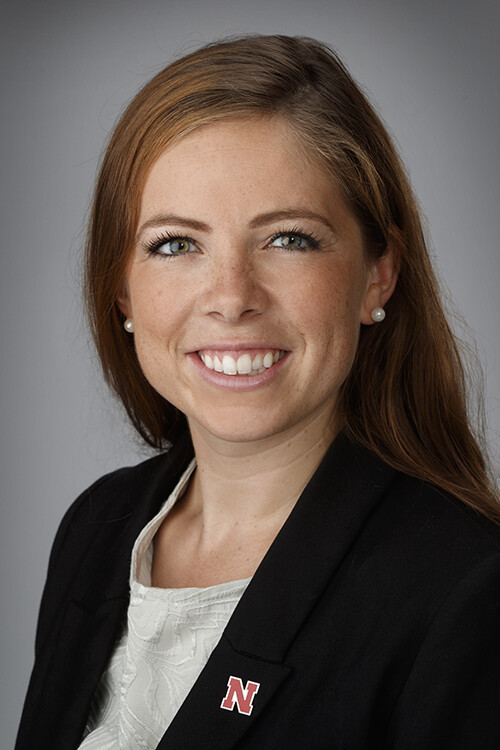
Wolf and her faculty adviser, Liz VanWormer, count themselves among the outliers. As an epidemiologist and coordinator of the Nebraska One Health program, VanWormer is heartened that a more holistic message is falling on suddenly receptive ears: Human health is a complex global issue, ultimately inseparable from the animals, plants and ecosystems that populate the planet.
But in bats, VanWormer sees much more than just vectors of disease. She sees pollinators and seed dispersers that help cultivate crops and forests the world over. She sees insect eaters that help protect those crops and may stifle the transmission of disease-driving viruses that mosquitoes can also carry.
And through VanWormer’s eyes, Wolf has come to see evolutionary wonders that might just teach humans how to bolster their own immune systems.
“It’s true: Bats can carry some pathogens that spread to people and other animals,” Wolf said. “But it’s primarily because their immune systems are absolutely, wildly amazing and fascinating and seem to make bats more tolerant in such a way that they can carry these pathogens and not themselves be affected.
“But because of the way that humans interact with the world right now, we are encroaching on wildlife habitat. There’s so much environmental disruption. We have not always had this kind of contact with wild animals, or put animals that shouldn’t be together in such close quarters.”
A few months ago, VanWormer, Wolf and her fellow graduate students began brainstorming ways to spread those messages and cast the nocturnal creatures in a more favorable light. They settled on the idea of reading, recording and posting bat-focused stories to YouTube.
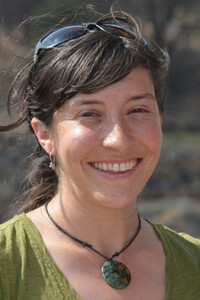
Then Wolf proposed another idea befitting the world-spanning creatures: Why not read the stories in multiple languages? The group liked the idea. Given the effort it would demand, though, Wolf knew it might well sink into the vast, crowded pool of ideas that “just kind of die in the water.”
“But I love languages, and I love cultures, so I was like, ‘I’m going to spearhead this. This is going to be my baby.’”
That love of language and culture sprouted in Wolf’s formative years, cultivated by a mother who advanced adult literacy and helped pave paths to citizenship for immigrants and refugees settling in Nebraska. It continued to flourish while earning her bachelor’s degree at Nebraska, especially after a summer spent studying abroad in Italy and traveling in India.
After graduating, Wolf took a position with Spain’s Ministry of Education. During their three years stationed in Spain, Wolf and her husband found time to visit roughly 40 countries — neighboring England and France, naturally, but also Turkey and Israel and Georgia and Armenia and a host of others. Since returning to the States and getting hired by IANR, her professional duties have taken her to Argentina and Rwanda.
All of that travel came in handy when Wolf took to Twitter, Facebook and Instagram to cast about for people interested in contributing to the project.
Hey multilingual Twitter! Want expand access to learning about bats for #BatMonth & #OneHealthDay coming up in Nov.? We have several languages covered already but interested in any/all, esp. ASL + indigenous languages.
Reply or DM me if interested! pic.twitter.com/jB0CFKHzUt— Brianne Wolf (@brianne_adele) October 9, 2020
“I got such a rousing response,” she said. “The brilliant thing about having traveled and lived in different places is that I’ve acquired this fabulous and fascinating network of people who are just from everywhere. And one of the brilliant things about social media is that we’ve actually stayed in touch. It’s so fun, because it’s like, ‘I haven’t talked to that person in five years, since we met in a hostel in Jerusalem.’ But these contacts, no matter how long it’s been, have usually said, ‘Yes, I will absolutely do a translation of this.’ It’s such a neat way to engage people from all over the world.”
Friends and friends of friends have already come through. The first posted video features the children’s book “Bo the Bat” being read in Arabic by a staff member from Lincoln’s Campbell Elementary School, where Wolf’s husband used to work. Classmates from Wolf’s undergraduate days are pitching in with Korean and Mandarin readings. Another friend, of Greek heritage, asked her father for help with a translation of the children’s book “Bat Loves the Night.”
“It was a really neat bonding experience for them, because they’re not doing much — just kind of sheltering at home during quarantine,” Wolf said. “They told me that they’re going to do other books and share it with nephews and nieces whom they hope to keep exposing to the Greek language.”
Students and faculty at the university are chipping in, too. Two recent videos came by way of graduate students from Colombia and India. A professor who hails from Bosnia recently read a story in her native tongue.
“We have just a spectacularly diverse array of cultures and countries and languages that are part of the university community,” Wolf said.
As a Spanish speaker with binding ties to both Spain and Mexico, Wolf had no trouble ensuring that her second language made an early appearance in the YouTube playlist. Even so, she’s hoping that other stories will soon join “Little Red Bat” and “Daft Bat” en Español.
“Even if you’ve seen your language represented, we’d love to have more,” she said. “Otherwise, parents are going to go insane playing that same story over and over again.
“And as we did this project, we realized there’s just such a dearth of books that are in other languages. So this also fills a need in that way. Families that are based in the United States, at least, just don’t have a lot of options when it comes to finding books in different languages, especially around a niche subject like bats.”
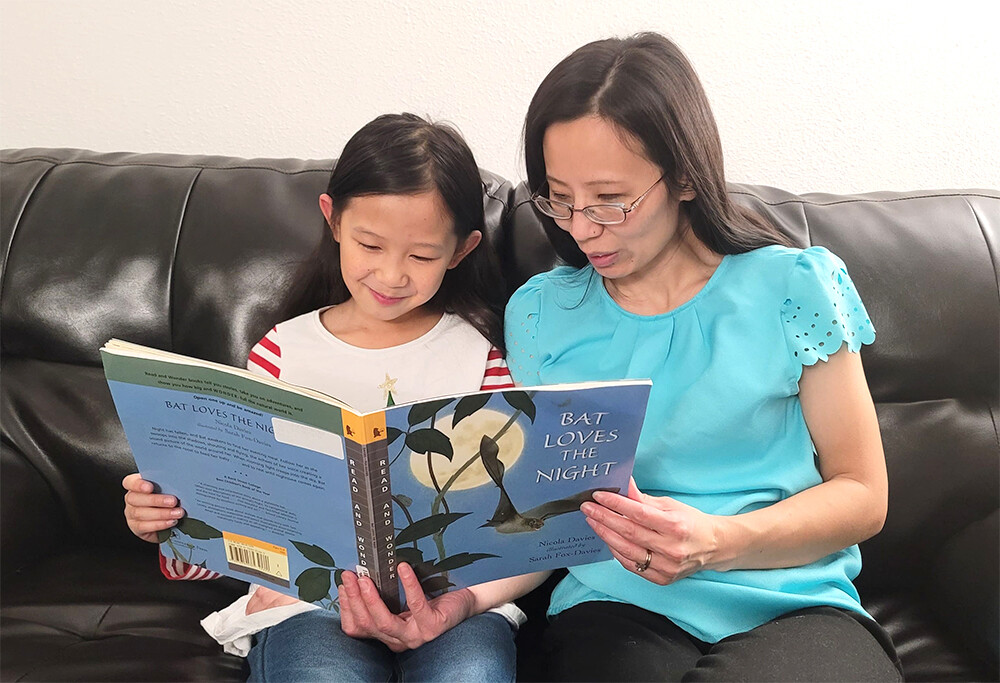
Wolf said 16 languages — including Haitian Creole, Thai and Conceptually Accurate Signed English — have already made their way into the linguistic stable over just the past few months. But she plans to, and has plans for, recruiting others through at least the first half of 2021. She’d love to add native languages: Lakota, Ponca, Omaha, Nahuatl, Maya. And she’s eager to approach Lincoln-based organizations such as the Asian Community and Culture Center and the Yazidi Cultural Center, which she’s hopeful might participate or spread the word to their communities.
“She brings such joy and energy to building partnerships,” VanWormer said of her advisee.
But to hear Wolf tell it — in English or Spanish — those partnerships are gifting her just as much as joy and energy as she’s putting into them.
“All these people have done this in a completely voluntary manner,” she said. “Many of them have no association with Nebraska, with the university, with bats, with science, with literacy. Everyone’s busy, and not everyone wants to take the time to do these things, but people will actually do a lot more than you think they would be willing to. They want to be part of something positive, something that brings families together, that brings more people into the fold.
“It’s so encouraging in these times, when we’re maybe feeling a little negative about people and the world, to get so many people who are willing to be a part of this and do something not for their benefit, not for any kind of recognition, but just to do something good. That’s been a wonderful thing to be reminded of.”
Interested in helping out? Contact Wolf at bwolf4@unl.edu or @brianne_adele.
